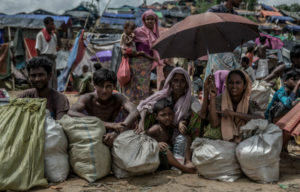Rohingya Crisis Appeal: Caritas volunteers join relief efforts
Tom Delamere is CAFOD’s Bangladesh Programme Officer. Here he tells us about his recent visits to Bangladesh, a country struggling to cope with the arrival of more than 582,000 refugees from Myanmar, on top of the devastating effects of recent flooding.
On landing in Dhaka, Bangladesh’s bustling capital city, two things immediately strike you. The first is the close, warm climate; growing up in the North of England didn’t really prepare me for South Asia’s summer temperatures. The second is just how busy the roads and streets are, ringing with vehicle horns, rickshaw bells and the movement of crowds of people.
Please donate to CAFOD’s Rohingya Crisis Appeal
What sticks in my mind the most about the country is the hospitality shown by its people – a warm welcome, a cup of char and an engaging conversation are never far away.
I have visited Bangladesh a couple of times this year, and have seen first-hand the challenges faced by a country living on the front line of climate change. I visited some of the areas affected by the devastating flooding that submerged almost a third of the country in August, resulting in the deaths of more than 140 people, displacing 200,000 and affecting a further 8.2 million people.
Another challenge for Bangladesh
Over the past month and a half, Bangladesh has been hit with another test. More than 582,000 people have arrived in small boats or on foot from neighbouring Myanmar, where they have fled violence.
The images we’ve seen on our screens of families squelching through mud and water to seek safety, and the stories we’ve heard about the thousands of women, men and children forced to abandon their homes, are truly shocking.
Please pray for people affected by this crisis
While they may have reached relative safety in Bangladesh, the conditions they face continue to deteriorate: with persistent monsoon rains and flooding, no permanent shelters, food, clean water or toilets, hunger and disease are on the prowl.
I’ve been in regular contact with staff from our local Church partner, Caritas Bangladesh, who have met with refugees. One staff member described seeing many people sleeping at the side of the road, or wherever they could find space, under no cover. Another described the look of trauma on a young girl’s face, who had travelled a long way from her home and was being looked after by family friends.
Working through local partners
CAFOD are responding to this crisis through our local partner Caritas Bangladesh. Working through local organisations is so effective because they know the local context and they are there to stay. Our Caritas colleagues were already working in these communities before this crisis began, and they will remain there throughout the emergency and long after it ends.

A huge impact is already being made on the lives of thousands of vulnerable families through the efforts of Caritas Bangladesh. They are giving out food parcels to each family that include four kilograms of dal lentils, one kilogram of sugar, 500 grams of salt and two litres of cooking oil. Each family is also given essential items like plates, spoons, cups and kitchen utensils, without which they couldn’t cook the food or feed their families.
Caritas volunteers join relief efforts
Last week, dozens of volunteers, accompanied by over 40 local aid workers from CAFOD’s partner Caritas Bangladesh, battled along muddy tracks to Kutupalong and Moinargona camps where they gave out emergency aid to vulnerable families.
Each day, thousands of families received food parcels, but Mazharul Islam, a disaster management specialist at Caritas, explained: “Many more people are coming than we can help. It is difficult having to turn people away.”
Help provide life-saving aid for vulnerable families
The scale of this crisis is hard to imagine. Cox’s Bazar, a small town in the south of Bangladesh nearby to where the refugees are arriving, has a population of roughly 50,000 people. It is about the same size as Crosby – the town in Merseyside where I went to school – and it is hard to imagine ten times the population arriving in just over a month.
Next month Pope Francis will be visiting Bangladesh, where he will bring a message of peace and coexistence. The Pope is fulfilling a commitment he made to ‘go out to the peripheries’ – and in Bangladesh he will certainly receive a very warm welcome.
Once the exodus is halted and the immediate emergency needs of the refugees in Bangladesh have been met, the task of the international community and the Bangladeshi Government must then turn to providing longer term support for those affected by the crisis.
Providing safe housing, education, healthcare, and counselling for people who have seen and experienced traumatic events, are just some of the more challenging tasks that lie ahead.